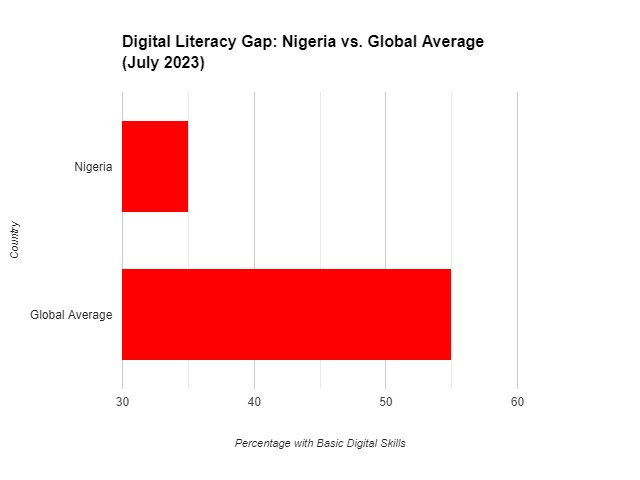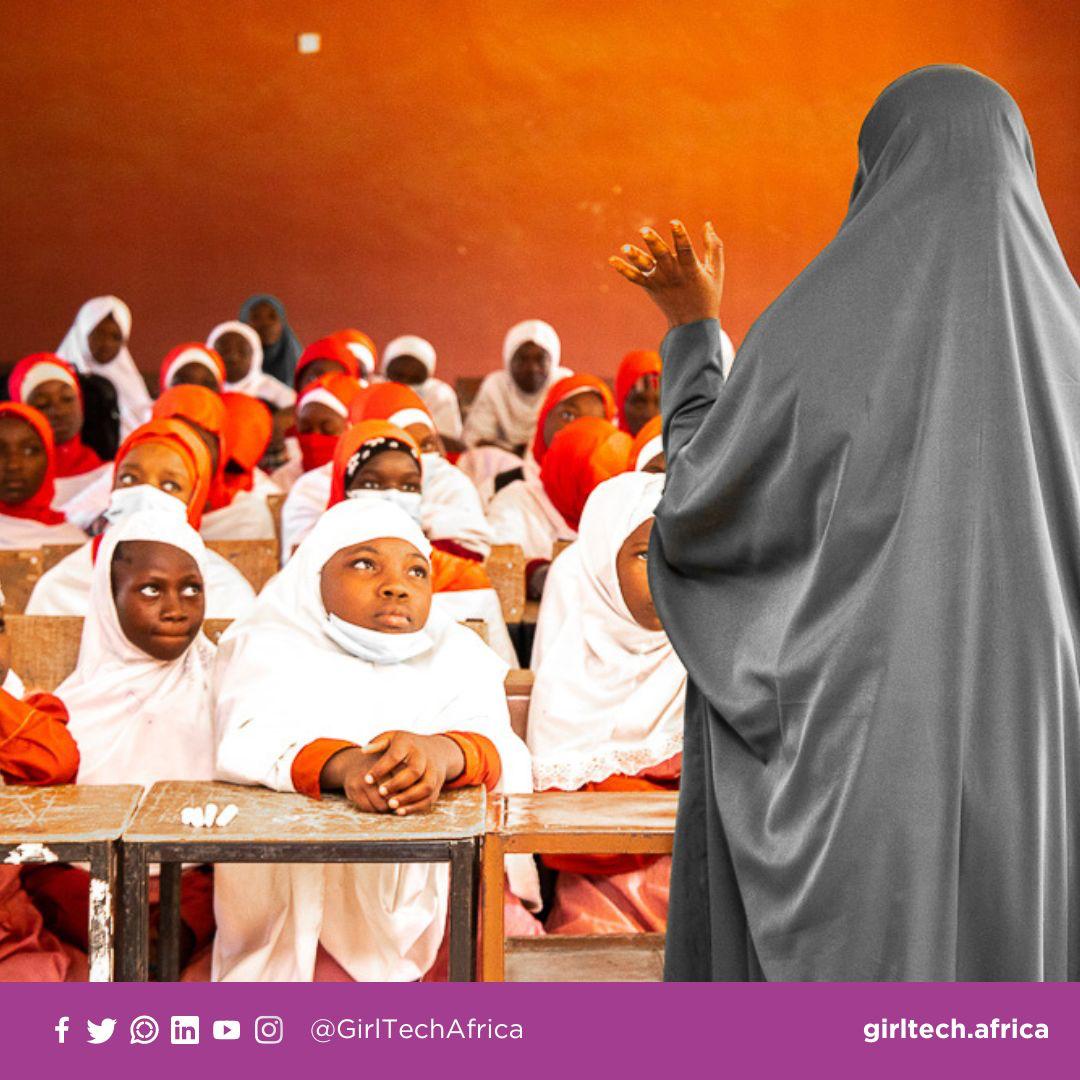“At first, it was my father’s wish for me to study computer science,” said Maryam Haliru, who grew up in Zaria within the Nigerian state of Kaduna.
When Maryam finished secondary school in 2015, her father supported her in enrolling in a computer science diploma program at the Iya Abubakar Institute of Computing and ICT. Maryam would later fall in love with the courses offered in the program where she graduated with good grades in 2017, Soon after, she applied for a degree program at Ahmadu Bello University in Zaria.
“While waiting for admission, someone close to me came home expressing his doubt that I couldn’t study computer science at the university. He felt it was difficult since even he, as a man, had a challenge studying it,” she recounted.
After her admission into computer science at Ahmadu Bello University in Zaria, Maryam excelled in the course. While there, she met Hafsah El-Yakubu, who spurred her into pursuing a career in cyber security and networking. Maryam and El-Yakubu became friends and attended lectures together.
El-Yakubu was familiar with the struggles students faced when venturing into the tech sector through her experience leading the STEM Coders Club at the university. She was also aware of the difficulty that recruiters faced in finding the right talent for tech roles.
Science, Technology, Engineering, and Math Coders, or STEM Coders, was founded in 2019 to build a vibrant community for tech enthusiasts on campus. It aims to create a platform that facilitates peer-to-peer learning and provides hands-on experience in the diverse fields of technology for students across multiple disciplines.
“I started as a vice president and later became the club president. While I and my colleagues, Khadijah Muhammad and Fatima Yahaya, were working on a collaborative project, we noticed a shortage of skilled and eligible tech professionals in the growing ecosystem,” El-Yakubu shared.
Nigeria, Africa’s largest economy, grapples with a shortage of tech talent, presenting challenges for local businesses and hindering the growth of startups aspiring to make a mark in the tech industry.
A report by the World Bank shows that only 35% of Nigerians have basic digital skills, which is significantly lower than the global average of 55%. Also, female representation in the Nigerian tech industry is notably low.

In a joint survey by ONE Campaign and the Center for Global Development among 93 technology firms, it was found that only 30% of these enterprises were managed by women, who concentrated in e-commerce and enterprise solutions. Of the surveyed firms, only six had a woman in a senior management position, while more than one-third of these firms had no female employees at all.
Examining these problems, El-Yakubu and her team founded Maha Technologies in 2023 as a recruitment agency that matched tech companies with skilled talents. Because Maha primarily focuses on emerging tech professionals and startups, the initiative creates a symbiotic ecosystem that connects both companies and talents with growth opportunities.
Maha Technologies isn’t committed to only job placements; its efforts also spread across continuous learning, skill enhancement, and career development. Mentorship programs and training sessions are provided for both talents and recruiters, which aligns with their vision of equipping all parties with the right resources. However, the initiative also runs a selection process known as the talent pool, where it hunts for individuals possessing technical expertise and exceptional soft skills. Criteria for eligibility include a good reputation for reliability, professionalism, and competence, along with relevant technical skills.
“We look out for those who demonstrate interest and a willingness to learn on the job. These are the essential attributes we seek in potential candidates. The selection process ensures that our pool consists of top-notch talents ready for exciting opportunities,” El-Yakubu said.
Although the recruitment services provided by Maha Technologies are paid, the impact of the initiative is evident in the stories of talents and recruiters who have found fulfilling roles and secured the right employees, respectively.
A life-changing opportunity
Before 28-year-old Maryam drifted into the tech space, her schoolwork involved cramming theories and creating solutions that never got implemented. Now, thanks to Maha Technologies, she can execute successful projects across such skills as artificial intelligence, networking, cyber security, and software development.
In November 2023, she assumed the duties of an intern project manager at Mediahooch Spaces. As part of her work, she mentors young girls for the GirlTech Africa project implemented by the organization.
“This opportunity was possible through Maha Technologies, and it helped me to gain more experience and grow rapidly in my field. I was also able to understand my strengths and weaknesses,” she told Prime Progress.
Overcoming gender barriers
For the many girls and women living in northern Nigeria and making their way into tech, gender barriers limit them from attaining greater heights in space. And this wasn’t an exception for Maryam.
According to a study by the Centre for Information Technology and Development, or CITAD, women are marginalized in the digital space; 55% of men in northern Nigeria do not want their wives to use the internet, and 61% of fathers discourage their daughters from using it.
Haliru, Maryam’s father, is one of the few men in the region who defied this norm and gave his daughter a chance to become a tech entrepreneur. On many occasions, Maryam was dissuaded from studying computer science or pursuing a career in cyber security and software development.
“I paid deaf ears to some of these talks because I already made up my mind, and today I’m not regretting it. I’m even more proud to be able to make my father happy,” Maryam expressed.
In the coming years, she hopes to become a cyber security expert who can spot unethical hacks quickly and take prompt action against them.

Navigating market dynamics
Despite the substantial success recorded since its inception, Maha Technologies has also encountered a set of operational challenges that continue to demand the team’s attention and strategic solutions.
Many of these challenges involve difficulties in expanding the initiative’s talent pool efficiently. More than this, Maha Technologies also confronts the ever-changing dynamics of the market, which demands a flexible approach that’s open to shifting trends. More often than not, this involves concerted efforts among all employees to keep the user experience smooth and seamless.
Going forward
The initiative is also working to secure strategic partnerships, enhance a continuous platform, and leverage edtech initiatives while expanding its reach to Africa’s far-flung communities.
“By fostering digital literacy and creating avenues for skill development, we hope to empower youth and build a rich pool of eligible, badass tech talents in Africa,” El-Yakubu stated.
While this initiative is one of numerous responses across Africa that have adopted STEM skills to enable the success of digital economies, El-Yakubu maintained that paving the pathway for sustainable and inclusive economic development within the tech industry is only possible when government and non-profit organizations invest in educational programs and training initiatives that nurture a tech-savvy workforce.
Maryam Haliru from Zaria, Nigeria, initially pursued computer science upon her father's encouragement and later developed a passion for it. She enrolled in Ahmadu Bello University and excelled, driven by her friend Hafsah El-Yakubu, who guided her toward a career in cyber security and networking.
El-Yakubu, familiar with challenges in the tech sector, co-founded STEM Coders Club to support tech enthusiasts. Recognizing a shortage of tech professionals in Nigeria, El-Yakubu and her colleagues established Maha Technologies in 2023 to connect tech talent with companies, focusing on continuous learning and skill enhancement.
The initiative emphasizes recruiting individuals with technical expertise and soft skills through a selective talent pool. Despite operational challenges, Maha Technologies aims to address the tech talent gap and promote gender inclusivity in Nigeria's tech industry. Maryam Haliru benefited from the initiative, assuming a project manager role at Mediahooch Spaces and mentoring girls through the GirlTech Africa project.
Maryam navigated gender barriers to succeed in tech, aspiring to become a cyber security expert. Maha Technologies continues to expand, seeking strategic partnerships and promoting digital literacy to build a robust tech talent pool across Africa.






